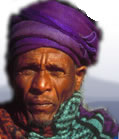 |
 |
||
 |
|||
|
RELATED THEMES communications development education OTHER LOCAL THEMES BACKGROUND |
health
There is some difference of opinion about whether or not health has generally improved, which may be explained largely by varying provision of modern medical facilities in the region. Where a local health station has been built, people speak enthusiastically about the benefits to the community. "There was no such medical service in the old days. You just give birth or suffer your illness." (Ethiopia 2). The importance of immunisation and of health education are both commented upon, as are improvements in reproductive health: "The doctor diagnoses them well and the offspring is well positioned in the womb thanks to the doctor's care. He will tell her about her problems in time" (Ethiopia 2). The epidemics of malaria which troubled people in the past seem to have been confined to the lowlands, although an outbreak in 1997 indicates a new resistance by malarial mosquitoes: "The government brought DDT in 1964 and sprayed it in the lowland areas. Since then we have been relieved of [malaria epidemics]. But in 1997 there was an outbreak of the old type of disease." (Ethiopia 9) Typhoid and smallpox are also mentioned as diseases of the past, and most of the major sexually transmitted diseases from which people suffered are now curable. However, although HIV/AIDS is not prevalent in the region people are aware that it is a major threat in the towns and that there is no known cure. It is referred to as "emaciator". Most know that it is primarily transmitted sexually, although some know little or nothing about it: "I am not aware of how it is transmitted or how it affects one. I was afraid to ask people, but I am trying to be careful" (Ethiopia 13). Some narrators say there are many more diseases nowadays and more deaths, but usually they attribute this to people's meagre diet: "The major disease now is hunger. Big and small have all fallen to the bed." (Ethiopia 4). One narrator claims: "The population has increased and famine coupled with dysentery are killing lots of people. They have no money to get medical treatment. If a doctor comes to our village and makes a survey, he won't find a household in which there are no people who haven't become bedridden due to hunger and disease. In some households there is no one even to give water to the sick members of the family." (Ethiopia 4) quotes about health"In the old days there were no doctors. The traditional students rubbed leaves and gave them to the sick person and he was cured. There were also psychic cases, those who were possessed, and some claimed to have the ability to cure them. There were not many diseases then because people fed on meat and milk. There was an epidemic of typhoid once in four or five years. Now the medicine created by science is destroying the typhoid throughout the country. Nowadays, however, there is no healthy person; even those who are walking are not well. Everyone is taking injections. We don't know the nature of today's diseases. They call it lung disease, kidney disease, stomach disease, but there is no medicine. There are doctors, but they are not able to cure." "In the old days when we fell ill suddenly, we took traditional medicine prepared from leaves. We sold our ox and cow and travelled on foot for a fortnight and reached Qobo, Tigray or Gonder. Now we climb in the car and go and get the medicine. In the old days we used to die on the road out of hunger and thirst. Deaths were not frequent then as they are now." |
|